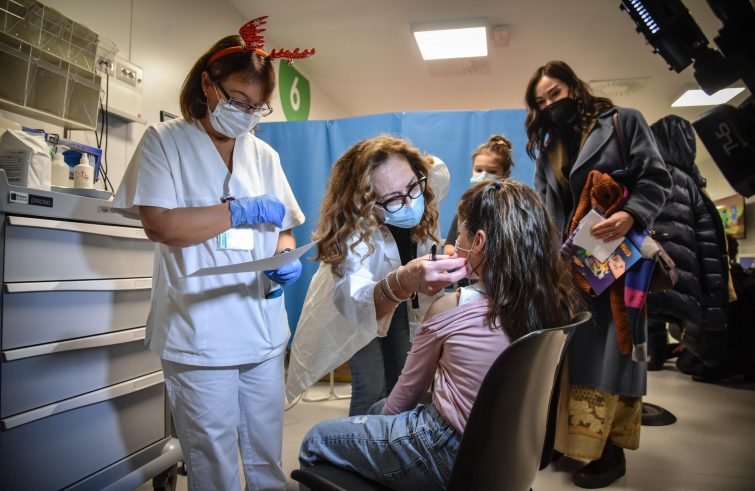
Getting vaccinated is “an act of love”, since it is aimed at the protection of people against COVID-19, said Pope Francis, who recently reiterated “the need for the international community to further intensify its cooperation efforts so that all have rapid access to vaccines.” These words were recalled in a statement issued today by the Holy See Press Office to mark the publication of two new documents by the Vatican Covid-19 Commission, established and operating within the Dicastery for Promoting Integral Human Development, and the Pontifical Academy for Life.
Speaking at the presentation of the two documents in the seat of the Pontifical Academy of Life (PAL), its president Monsignor Vincenzo Paglia referred to a “parallel pandemic”, which has affected and continues to affect children and adolescents in particular, deeply impacting on their psychological development and creating anxiety, disorientation and stress. The first document, drawn up by the Pontifical Academy in conjunction with the Dicastery for Promoting Integral Human Development and the Vatican COVID-19 Commission, is entitled: “The Pandemic and the Challenge of Education.” The second, prepared by the Vatican COVID-19 Commission, addresses specifically “Children and COVID-19: the pandemic’s most vulnerable victims.”
“Ensuring the highest degree of safety in school buildings is a measure of urgency for governments, and distance learning should be a last resort”,
said Msgr. Paglia in the presentation of the first document, dedicated to education. However, he acknowledged, “the coming months can hardly be faced without offering appropriate support (social, cultural, administrative, economic) to families, who are likely to continue bearing the consequences of the pandemic emergency”.
It is equally necessary to promote “universal fraternity, in accordance with Pope Francis’ encyclical.
With the pandemic the entire world has entered every household: those of the wealthiest and oldest countries and those of the youngest but still developing countries.” “We should resume our activities in the Christian community with a new impetus,” concluded the president of the Pontifical Academy for Life. “Let’s renew the close ties between families, associations, parishes and movements, so that this difficult time may be seized as an opportunity to grow and become better, as Pope Francis often reminds us.”
The pandemic has plunged many children into extreme poverty, leaving as many without parents or relatives to look after them. Exploitation and violence against children have increased worldwide. It is therefore urgent for governments, civil society organisations and the Church to join forces to alleviate their suffering. The Vatican COVID-19 Commission proposed nine urgent actions in its second document: five for the political world and four for the Church.
“Promote the equitable distribution of COVID-19 vaccines”
because “the impacts of the virus on child adversity can only be fully mitigated if the spread of COVID-19 is limited”, is the first measure. “Getting a vaccine is an act of love, love for oneself, love for our families and friends, and love for all peoples.” “Strengthen systems that promote family-based care for children: COVID-19 moves quickly and leaves families little time to prepare.” For this reason, Catholic Relief Services and its partners have launched the initiative “Changing the Way We Care”, with useful resources for governments and their partners to ensure that children stay with their families.”
Moreover, the Vatican Commission calls on governments to increase budget spending for structures aimed at protecting children from violence, exploitation and neglect.
“Dioceses and parishes should be prepared to intervene rapidly when families are affected by Covid-19: As Covid-19 progresses quickly, parishes can assemble rapid response teams to proactively identify at-risk families, provide them with prayer and care, guide them through the bereavement process, and support them after their loss,” the document states.
Parishes are invited to intervene against abuse,
since “parishes can work to reduce the normalization of violence against children within and outside of the family”, and create safe spaces where “children at risk can receive counseling and support as a full and valued member of the parish community.” Finally, it’s important to “set up peer support groups” and “promote positive parent-child relationships through parent training programs.”












